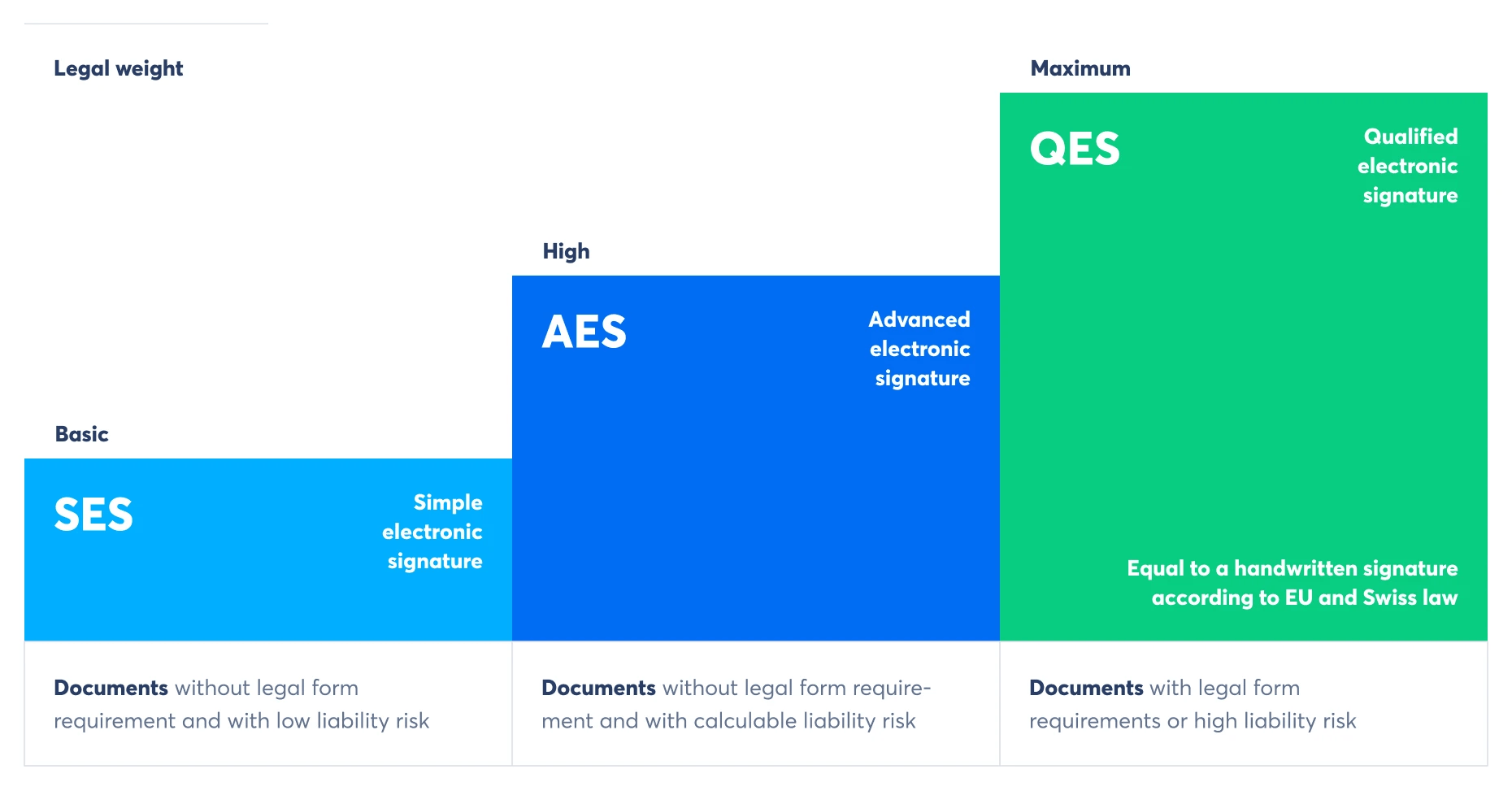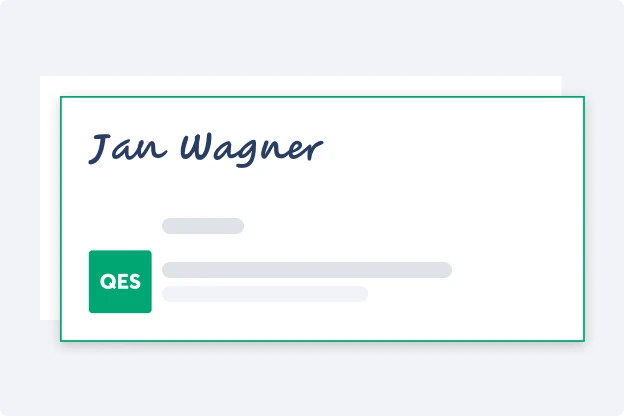Conclusion: Choosing the right signature service depends on usage frequency and the required signature standard. If you’re looking for a legally compliant, intuitive, and flexible solution, you can start directly with Skribble—with maximum security and all signature standards from one source.
Digital Signature Costs: Skribble Prices and Plans

Piles of paperwork, waiting times, and high shipping costs—traditional signing processes are cumbersome and expensive. But there’s a better way: Digital signatures speed up processes, save resources, and ensure legally compliant documentation. But which signature is right for you? And what are the associated costs? Discover what matters when it comes to digital signatures and how to find a plan that fits your company.
The essentials at a glance
- Costs depend on the signature standard and identity verification. Qualified signatures offer particularly high security but are more expensive.
- Digital signatures are cheaper than analog processes, as there’s no shipping or material involved. Processing can also be significantly accelerated.
- Skribble offers a simple and legally valid option for companies that want to sign documents quickly and securely—with flexible plans and all signature standards in one service.
Why Pay for Digital Signatures?
A digital signature not only offers a convenient way to sign documents but also meets high legal requirements. Unlike handwritten signatures or simple electronic signatures, qualified electronic signatures (QES) provide verifiable security that is legally recognized. Costs mainly arise from identity verification, issuing qualified certificates, and securely operating the signature platform.
Security and Legal Validity
Free or insecure tools often do not offer the legal and security standards that companies need. A legally valid digital signature requires:
- Legal Compliance according to eIDAS and ZertES for signatures recognized throughout Europe
- Identity verification for clear attribution of the signature
- Certificates and encryption for tamper-proof evidence
Process Optimization and Cost Savings
Digital signatures save time and reduce operating costs. Instead of printing, sending, and manually archiving physical documents, contracts can be signed and managed digitally in just a few clicks. Businesses benefit from:
- Faster contract completion with instant digital signatures
- Lower paper and shipping costs, as everything runs online
- Time-saving document management, with no risk of lost or incomplete files

Which Factors Influence the Cost of a Digital Signature?
The cost of a digital signature depends on several factors. Prices may vary depending on provider, selected signature standard, and additional services. Taking a closer look at the main factors helps you find the right options for your business.
Differences Between Providers and Pricing Structures
Each provider of electronic signatures uses its own pricing models. Some rely on pay-per-signature, others on usage-based packages or subscription-based plans.
- Pay-per-signature: Ideal for businesses with low signing needs, as only individual signatures are billed.
- Monthly or annual plans: Often cheaper with regular use. These usually include a certain number of signatures per month or year.
- Enterprise solutions: Tailored packages for companies with high signature volumes.
Included Services and Additional Costs
In addition to the actual signature, other services can influence the cost. These include:
- Signature standard: Simple electronic signatures (EES) are usually cheaper than advanced (FES) or qualified signatures (QES). The latter require identity verification, which may incur additional costs.
- Identity verification: For qualified signatures, online identification or in-person identification is required. Depending on the method, this may be charged once or per use.
- Legal assurance: Some providers include certification services and audit logs in the price, while others charge these separately.
- Integration into existing systems: API access or plug-ins for document management systems may be included or subject to extra fees depending on the provider.
- Storage and access: Some services offer unlimited access to signed documents, while others limit storage capacity or charge extra for archiving functions.
One-Off vs. Recurring Costs
The pricing for digital signatures can involve both one-off and recurring costs.
One-off costs mainly arise from identity verification for qualified electronic signatures (QES), API setup fees, or integration into company systems. Recurring costs consist of monthly or yearly subscriptions, usage-based billing, and additional signatures beyond the included quota.
For companies that regularly use digital signatures, ongoing plans are often more economical than individual billing. At Skribble, there are flexible packages for individuals, teams, and enterprises that cover all signature standards.

Not every document needs to be signed with a QES. In many cases, a simple or advanced electronic signature is sufficient.
A QES is required for:
- Credit and leasing contracts
- Employment contracts with a written form requirement
- Company formations and commercial register entries
- Contracts with high liability risk
An EES or FES is sufficient for:
- Internal approvals and authorizations
- Standard contracts without statutory written form
- Orders, offers, and framework agreements
Note: If you regularly use QES, you can save costs in the long term with a suitable tariff model. With Skribble, all three signature standards are united in one service—transparent, legally valid, and easy to use.
Skribble Prices: What Options Are Available?
The price of an electronic signature depends on the plan chosen and the signature standard required. We offer four plans: Individual, Team, Pro, and Scale.
Skribble Plans Overview
Each plan includes a certain number of signatures and features:
| Plan | Monthly cost per user | Included signatures | Key features |
|---|---|---|---|
Individual | CHF 9 | 120 EES per year | Single user, external signatures without an account, set signing order |
Team | CHF 23 | Unlimited EES, 72 FES/QES per year | Unlimited EES, admin area, send reminders, add attachments |
Pro | CHF 36 | Unlimited EES, 120 FES/QES per year | All from Team plan, automated deletion, company branding, API integrations |
Scale | Individual | As needed | Phone support, customer success, individual cost center assignment |
Which Signature Standards Are Included?
Depending on the plan, different types of signatures are included:
- Simple electronic signature (EES): Included in all plans, ideal for documents with no written form required.
- Advanced electronic signature (FES): Available from the Team plan, suitable for documents with calculable liability risk.
- Qualified electronic signature (QES): Included from the Team plan, necessary for documents with statutory written form requirements.
Pay-per-Use vs Subscription Models
Skribble relies exclusively on subscription models, as these offer companies clear and plannable costs. Unlike pure pay-per-use models, subscriptions allow calculable use and already include a set signature quota.
If the included quota is exceeded, you can flexibly purchase additional signatures—without being bound to a pure pay-per-use model. This keeps the cost structure transparent and manageable for companies:
- FES in Team plan: CHF 2.50 per signature
- QES in Team plan: CHF 4.50 per signature
- FES in Pro plan: CHF 2 per signature
- QES in Pro plan: CHF 4 per signature
Try Skribble with no obligation and test all Pro plan features.

Conclusion: How to Save Costs with Skribble
Digital signatures not only reduce administrative effort but also enable legally valid and secure contract completion. Costs depend on various factors, including the signature standard selected, identity verification, and additional features. While qualified electronic signatures (QES) are more expensive due to strict legal requirements, they provide the highest evidential value and security.
Skribble uses transparent subscription models that offer businesses predictable costs and fair value. Unlimited simple signatures are already included, and qualified signatures can be flexibly added as needed. This gives you scalable and cost-effective digital signatures—without hidden fees or complicated pricing structures.
Digital Signature Costs – Frequently Asked Questions
Yes, Skribble meets the EU’s eIDAS regulation and ZertES in Switzerland. This means all signatures are legally recognized across Europe and Switzerland.




